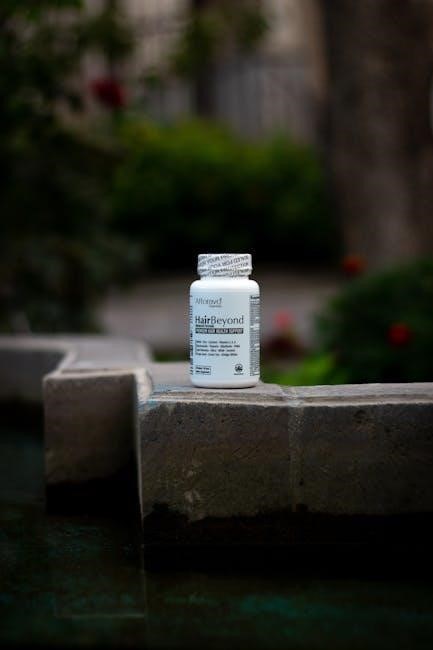Folic acid‚ a B-vitamin‚ is essential for various bodily functions‚ including DNA synthesis and red blood cell formation. The Davis Drug Guide details its dosage‚ side effects‚ and interactions‚ emphasizing its role in preventing birth defects and managing deficiencies.
1.1 What is Folic Acid?
Folic acid‚ also known as folate‚ is a B-vitamin essential for various bodily functions. It occurs naturally in foods like leafy greens and is added to fortified products. Folic acid plays a crucial role in DNA synthesis‚ red blood cell formation‚ and preventing deficiencies‚ as detailed in the Davis Drug Guide.
1.2 Importance of Folic Acid in Human Health
Folic acid is crucial for DNA synthesis‚ cell division‚ and preventing deficiencies like macrocytic anemia. It supports red blood cell production‚ nerve function‚ and fetal development during pregnancy‚ reducing birth defect risks. The Davis Drug Guide highlights its essential role in maintaining overall health and preventing conditions associated with inadequate intake.

Biological Functions of Folic Acid
Folic acid is vital for DNA synthesis‚ red blood cell formation‚ and preventing birth defects. It supports nerve function and overall health‚ as detailed in the Davis Drug Guide.
2.1 Role in Red Blood Cell Formation
Folic acid is crucial for producing red blood cells‚ preventing macrocytic anemia. It works with vitamin B12 to ensure proper cell development and oxygen transport‚ as outlined in the Davis Drug Guide. Deficiency can lead to enlarged‚ ineffective red blood cells‚ impairing oxygen delivery throughout the body.

2.2 Importance in DNA Synthesis
Folic acid is vital for DNA synthesis‚ enabling cell replication and repair. According to the Davis Drug Guide‚ it supports the formation of genetic material‚ ensuring accurate cell division. This role is particularly critical during periods of rapid growth‚ such as pregnancy‚ to prevent birth defects and maintain overall health.
2.3 Nervous System Function and Health
Folic acid plays a crucial role in maintaining nervous system health by supporting nerve function and neurotransmitter synthesis. Alongside vitamin B12‚ it helps prevent neurological disorders. Deficiency can lead to conditions like neuropathy‚ emphasizing the importance of adequate intake for optimal nerve health and overall neurological function.
Folic Acid Dosing and Recommendations
The Recommended Dietary Allowance (RDA) for folic acid is 400 mcg daily. Timing and dosage are critical‚ especially for pregnancy‚ to prevent birth defects and ensure optimal health outcomes.
3.1 Recommended Dietary Allowance (RDA)
The RDA for folic acid is 400 mcg daily for adults. This recommendation ensures adequate intake for essential functions like DNA synthesis and red blood cell production. Higher doses may be advised for specific conditions‚ such as pregnancy or deficiency‚ to maintain optimal health and prevent complications.
3.2 Dietary Folate Equivalents (DFE)
Dietary Folate Equivalents (DFE) measure the bioavailability of folic acid and natural folate. One mcg DFE equals 1 mcg folate from food or 0.6 mcg folic acid from supplements‚ reflecting higher absorption of synthetic forms. This system standardizes intake recommendations‚ ensuring accurate nutrient assessment for optimal health outcomes.
3.4 Adjustments for Specific Conditions
Individuals with certain conditions may require adjusted folic acid intake. Pregnant women‚ those with celiac disease‚ or people on medications like methotrexate often need higher doses. Specific conditions may necessitate personalized recommendations to ensure adequate levels without exceeding safe limits‚ emphasizing the importance of medical guidance for optimal health outcomes.
Sources of Folic Acid
Folic acid is found naturally in leafy greens‚ citrus fruits‚ and legumes. Fortified cereals‚ bread‚ and supplements are additional sources‚ ensuring adequate intake for optimal health benefits.

4.1 Natural Sources (Folate)
Natural folate is abundant in dark leafy greens like spinach and kale‚ citrus fruits‚ legumes‚ and whole grains. These foods provide essential nutrients‚ supporting red blood cell production and overall health‚ as highlighted in the Davis Drug Guide.
4.2 Fortified Foods
Fortified foods‚ such as breakfast cereals‚ bread‚ and pasta‚ are enriched with folic acid to boost public health. These products help meet dietary needs‚ especially for populations at risk of deficiency‚ as outlined in the Davis Drug Guide.
4.3 Supplements and Multivitamins
Supplements and multivitamins are reliable sources of folic acid‚ providing the recommended daily allowance of 400 mcg. They are especially beneficial for individuals unable to meet their needs through diet alone‚ ensuring adequate intake and preventing deficiency‚ as detailed in the Davis Drug Guide.

Folic Acid Deficiency
Folic acid deficiency occurs when insufficient levels lead to health issues like macrocytic anemia and nerve damage. It disrupts DNA synthesis and red blood cell formation‚ as detailed in the Davis Drug Guide.

5.1 Symptoms of Deficiency
Folic acid deficiency can lead to fatigue‚ weakness‚ and shortness of breath due to impaired red blood cell production. Additional symptoms include pale skin‚ numbness‚ tingling‚ and difficulty concentrating. Severe cases may cause gastrointestinal issues like diarrhea or abdominal pain‚ highlighting the importance of early detection and treatment.
5.2 Health Consequences
Folic acid deficiency can lead to macrocytic anemia‚ impairing red blood cell function and oxygen transport. It may also affect DNA synthesis and nerve function‚ increasing risks of birth defects like spina bifida and cardiovascular issues due to elevated homocysteine levels‚ emphasizing the need for early intervention.
5.3 Risk Factors for Deficiency
Risk factors for folic acid deficiency include inadequate dietary intake‚ malabsorption syndromes‚ pregnancy‚ excessive alcohol consumption‚ and certain medications. Conditions like celiac disease and chronic diarrhea impair folate absorption‚ while high demands during pregnancy increase deficiency risks. Certain demographics and genetic factors further exacerbate susceptibility to insufficient folic acid levels.

Folic Acid and Pregnancy
Folic acid is crucial during pregnancy to prevent birth defects of the brain and spine. The recommended dosage is 400 mcg daily‚ starting before conception to ensure optimal protection throughout pregnancy.
6.1 Preventing Birth Defects
Folic acid prevents up to 70% of neural tube defects‚ such as spina bifida and anencephaly. It also reduces risks of heart defects and cleft lip/palate. Supplementation before conception is critical for early neural tube formation‚ as these defects occur early in pregnancy.
6.2 Timing and Dosage for Pregnant Women
Pregnant women should take 600 mcg of folic acid daily‚ starting before conception and continuing through the 12th week. This dosage helps prevent neural tube defects‚ which occur early in pregnancy. Supplementation is crucial during this critical period of fetal development.
6.3 Importance of Preconception Planning
Preconception planning is crucial for ensuring adequate folic acid levels before pregnancy. Women of childbearing age should take 400 mcg daily‚ as neural tube defects occur early in pregnancy. Planning allows time to address deficiencies and ensures protection from the start‚ even if pregnancy is unplanned.
Folic Acid Interactions
Folic acid interacts with vitamin B12 and certain medications‚ affecting absorption and efficacy. Monitoring is essential‚ especially for pregnant women and those with chronic conditions‚ as per the Davis Drug Guide.
7.1 Relationship with Vitamin B12
Folic acid and vitamin B12 work synergistically to form red blood cells and support nerve function. A deficiency in B12 can lead to a functional folate deficiency‚ impairing DNA synthesis and exacerbating anemia. Both vitamins are crucial for maintaining healthy neurological function and preventing macrocytic anemia‚ as detailed in the Davis Drug Guide.
7.2 Drug Interactions
Folic acid interacts with various medications‚ such as anticonvulsants (e.g.‚ phenytoin‚ carbamazepine)‚ which may require higher doses. Sulfasalazine can reduce folate absorption‚ necessitating increased intake. The Davis Drug Guide highlights these interactions‚ emphasizing the need for tailored dosing to optimize therapeutic outcomes and minimize adverse effects. Proper monitoring is essential to ensure efficacy and safety.
7.3 Impact of Diet on Absorption
Diet significantly affects folic acid absorption‚ with synthetic forms being more bioavailable (85%) than natural folate (50%). Food processing and certain dietary factors can inhibit absorption‚ while fortified foods enhance intake. The Davis Drug Guide highlights these interactions‚ emphasizing the role of diet in optimizing folic acid utilization and overall health benefits;

Food Fortification and Bioavailability
Folic acid fortification enhances bioavailability‚ with synthetic forms absorbed more efficiently (85%) than natural folate (50%). Public health initiatives‚ like enriching grains‚ have significantly improved folate intake‚ as detailed in the Davis Drug Guide.
8.1 History of Folic Acid Fortification
Folic acid fortification began in the late 20th century to address deficiencies and prevent birth defects. Mandatory enrichment of cereals and grains was implemented in many countries‚ significantly reducing neural tube defects. This public health initiative‚ supported by organizations like the CDC‚ has proven highly effective in improving population health outcomes globally.
8.2 Bioavailability of Folic Acid vs. Natural Folate
Folic acid‚ the synthetic form‚ has higher bioavailability (85%) compared to natural folate (50%). This means less folic acid is needed to meet nutritional requirements‚ as the body absorbs it more efficiently. This difference is crucial for supplementation and fortification strategies to ensure optimal nutrient intake and health benefits.
8.3 Impact on Public Health
Folic acid fortification has significantly reduced neural tube defects‚ preventing up to 70% of cases. It benefits public health by ensuring widespread nutrient availability‚ particularly for vulnerable populations. This strategy enhances overall health outcomes‚ reducing congenital disabilities and promoting healthier communities through preventive nutrition initiatives.
Health Benefits of Folic Acid
Folic acid prevents birth defects‚ supports red blood cell formation‚ and aids DNA synthesis‚ making it crucial for overall health and development.
9.1 Prevention of Anemia
Folic acid plays a crucial role in preventing anemia by supporting red blood cell production. A deficiency can lead to macrocytic anemia‚ characterized by large‚ immature red blood cells. Adequate intake of 400 mcg DFE daily helps maintain healthy red blood cells‚ preventing this condition. Supplementation is often recommended for those at risk.
9.2 Cardiovascular Health
Folic acid supports cardiovascular health by reducing homocysteine levels in the blood‚ which‚ when elevated‚ are linked to heart disease. Lower homocysteine levels can help prevent conditions like atherosclerosis and coronary artery disease‚ promoting overall heart health and reducing the risk of cardiovascular complications.
9.3 Neurological Benefits
Folic acid plays a crucial role in maintaining neurological health by supporting nerve function and development. It aids in the synthesis of neurotransmitters and protects against neurological defects‚ particularly during fetal development. Adequate intake is vital for preventing conditions like neural tube defects and supporting overall nervous system function.
Ensuring Adequate Intake
Adequate folic acid intake is crucial for optimal health‚ preventing deficiencies‚ and supporting key bodily functions. Regular dietary assessments and supplementation ensure sufficient levels‚ promoting overall well-being and preventing related health issues effectively.
10.1 Dietary Planning
A well-structured diet is key to meeting folic acid needs. Incorporate natural sources like leafy greens‚ citrus fruits‚ and fortified cereals. Check food labels for folic acid content. Aim for 400 mcg DFE daily for adults‚ balancing natural folate and fortified foods to ensure adequate intake and prevent deficiencies‚ supporting overall health effectively.
10.2 Role of Supplements
Folic acid supplements are crucial for ensuring adequate intake‚ especially for high-risk groups like pregnant women. They help fill nutritional gaps when dietary intake is insufficient; The Davis Drug Guide recommends 400-800 mcg daily‚ tailored to individual needs. Supplements are particularly vital for preventing birth defects and managing deficiencies effectively without exceeding dosage limits.
10.3 Monitoring and Testing
Regular monitoring of folic acid levels is essential‚ especially for pregnant women and those with deficiencies. Blood tests measure folate levels to ensure adequacy. The Davis Drug Guide highlights the importance of testing to prevent deficiencies and associated risks‚ ensuring optimal health outcomes through accurate monitoring and timely adjustments.

Special Populations and Needs
Folic acid is crucial for preventing birth defects in pregnancies. Women of childbearing age need 400 mcg daily. The Davis Drug Guide emphasizes higher doses for pregnant women‚ vegetarians‚ and the elderly‚ addressing absorption challenges and deficiency risks.
11.1 Pregnant and Breastfeeding Women
Pregnant women need 400 mcg of folic acid daily to prevent birth defects. Breastfeeding women also require adequate intake for milk production and overall health. The Davis Drug Guide recommends higher doses for those with specific conditions‚ ensuring proper fetal development and maternal well-being during pregnancy and lactation.
11.2 Vegetarians and Vegans
Vegetarians and vegans must ensure adequate folic acid intake through fortified cereals‚ leafy greens‚ and legumes. The Davis Drug Guide highlights the importance of monitoring levels‚ as plant-based sources have lower bioavailability compared to animal products‚ necessitating careful dietary planning or supplementation to meet daily requirements effectively.
11.3 Elderly and Chronically Ill Individuals
Elderly and chronically ill individuals often face challenges in absorbing folic acid due to reduced stomach acid and impaired digestion. The Davis Drug Guide suggests higher intake or supplements for these groups to prevent deficiencies‚ ensuring proper nerve function and red blood cell formation‚ which are crucial for overall health maintenance.
Folic acid is crucial for health‚ supporting red blood cell formation‚ DNA synthesis‚ and preventing birth defects. The Davis Drug Guide emphasizes its importance and proper supplementation strategies.
12.1 Summary of Key Points
Folic acid is vital for preventing birth defects‚ supporting DNA synthesis‚ and forming red blood cells. The RDA is 400 mcg DFE daily‚ with sources including fortified foods and supplements. Proper balance with Vitamin B12 is crucial for optimal health benefits and preventing deficiencies;
12;2 Final Recommendations
Consuming 400 mcg DFE of folic acid daily is crucial for overall health. Include fortified foods and supplements in your diet to meet this requirement. Women of childbearing age should ensure adequate intake to prevent birth defects. Consult healthcare providers for personalized dosing‚ especially during pregnancy or specific conditions. Regular monitoring ensures optimal folate levels and prevents deficiencies effectively.

